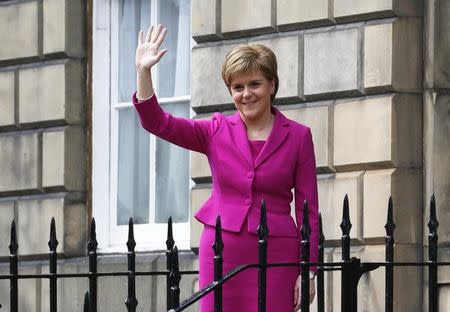Sturgeon "reasonably confident" Scotland will vote to stay in EU

EDINBURGH (Reuters) - Scottish First Minister Nicola Sturgeon said on Wednesday she is "reasonably confident" Scotland will vote to remain in the European Union in next month's referendum. All five parties in Scotland's devolved parliament support British membership of the European Union, arguing that important trade and political links need to be preserved. UKIP, a party which supports a British exit, did not win any seats at last week's election for Scotland's devolved parliament. "At this stage I am reasonably confident that there will a significant vote in Scotland to stay in the European Union but (...) I have a job to do to make sure that is the case," she told a news conference. Scotland has about 3.9 million registered voters, out of a total of 44.7 million across the United Kingdom's four constituent parts, according to official statistics. Sturgeon has raised the possibility of another Scottish referendum on independence if Scotland votes to stick with the EU in the June 23 referendum and Britain as a whole votes out. She said it was important that those who are supporting a vote to remain run a positive campaign. "One of the things that a campaign could do is encourage people to think about the opportunities that are on offer rather than cowering in a corner feeling fearful, and I hope that (the campaign) will do that," she added. So far Scottish support for staying in the European Union is 57 percent, a Survation poll for the Daily Record showed earlier this week, higher than other polls indicate for Britain as a whole. However the same poll also found 21 percent of Scots were undecided. Scotland voted 55 percent to 45 percent against independence from the United Kingdom in a 2014 referendum. But a few days earlier it had looked like Scotland might vote to split and British politicians offered Scotland's devolved parliament new powers to encourage Scots to reject secession. Sturgeon's Scottish National Party then took all but three of Scotland's 59 seats in the British parliament in a May 2015 general election. (Reporting by Elisabeth O'Leary; editing by Stephen Addison)

